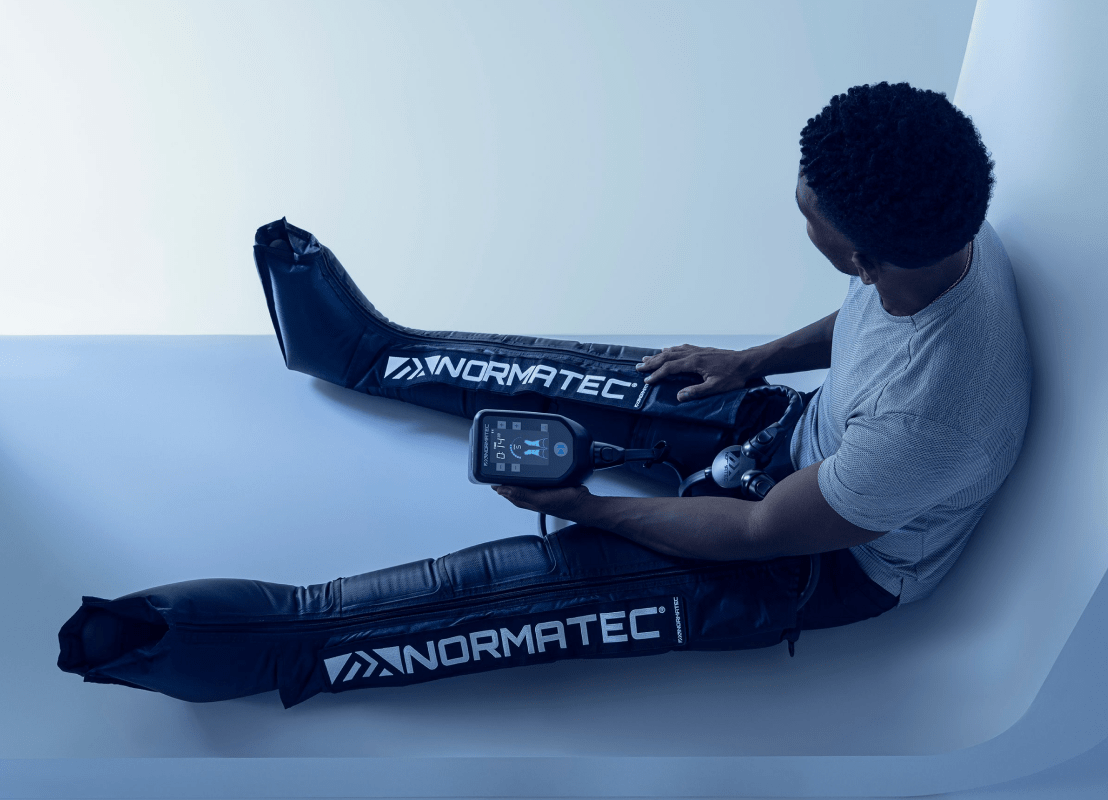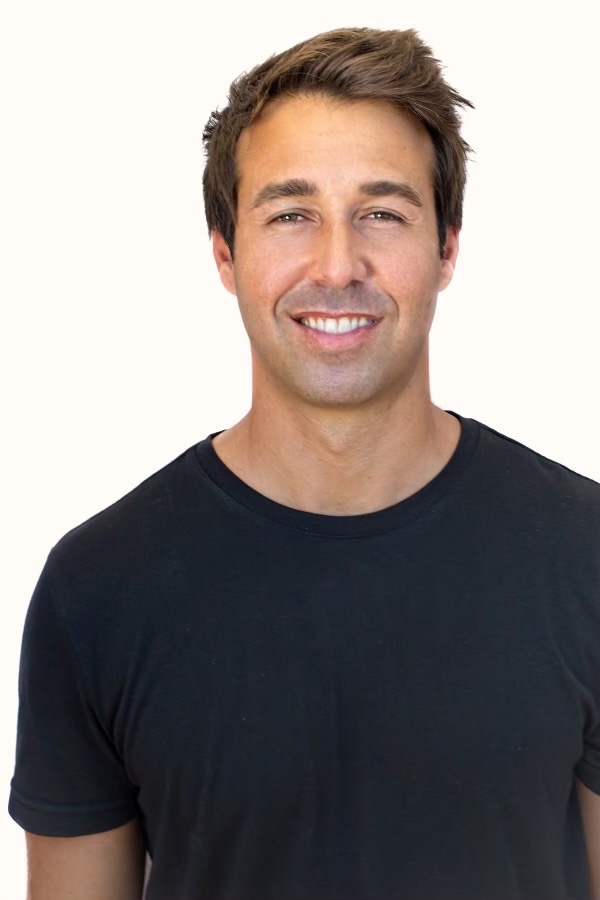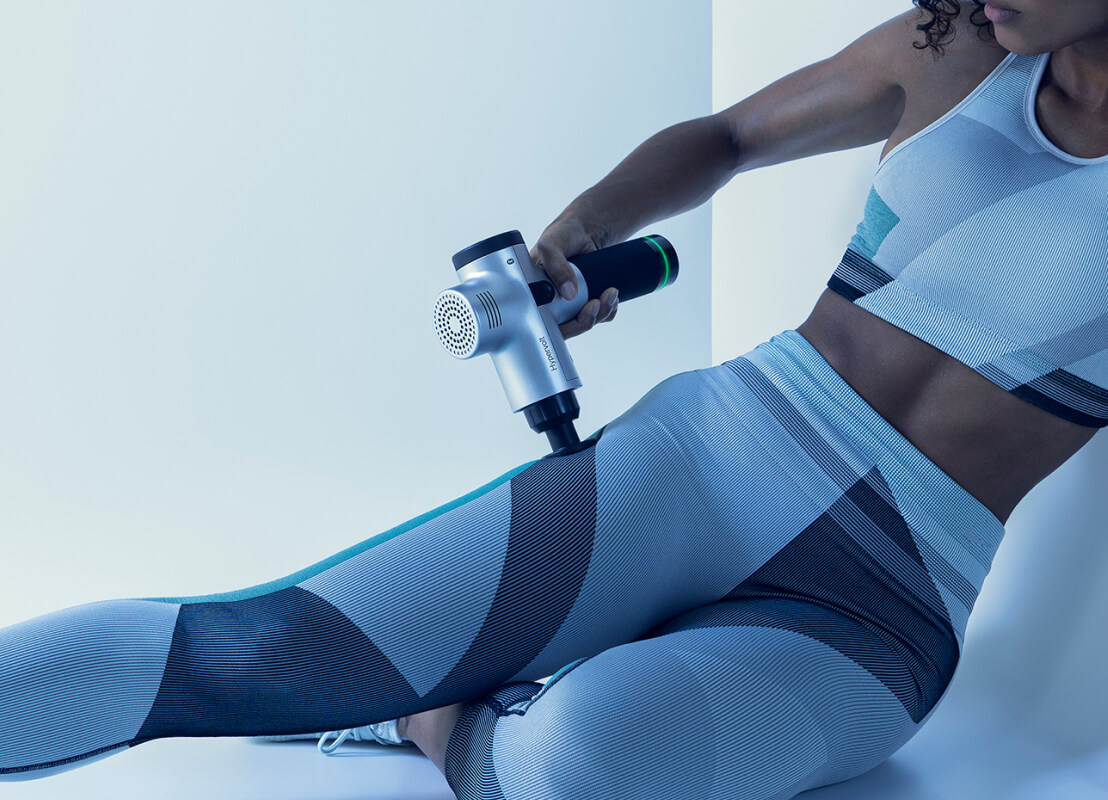Launched in 2010 by high-school-teacher-turned-entrepreneur Anthony Katz, Hyperice is the world’s leading recovery and wellness technology company. Its recovery solutions may be favored by the world’s athlete elite, but founder Katz is on a mission to render them accessible to all. What does it take? “We’ve always been able to see around the corner”.
Hyperice specializes in vibration, percussion, and thermal technology, and dynamic compression. It is used by athletes and professional sports leagues to optimize player performance, as well as organizations in the fitness, healthcare, and wellness space. In March 2020, Hyperice acquired Normatec, innovators of cutting-edge dynamic compression systems, and in December 2020 RecoverX, pioneers of intelligent thermal technologies.
Let's start with the future. Where do you see Hyperice in the years to come?
Think of a brand like Apple, where they have technology that handles every bit of my communication life. I want to be the Apple for the athlete, like: “I’m going to train and my body needs to be at the optimal state before I go do that, so that it’s moving the most efficiently, removing the risk of injury and I’m building this into a routine; or “Last night I played basketball, so I’ll make sure I get my Normatec before I go to bed.”
We all have routines we don’t think about anymore - like tooth brushing, using mouth floss, or mouthwash. We should have that same routine for our bodies. So, we are trying to create the technology that Apple is doing to communication life, or like oral hygiene – we call it “soft tissue hygiene”.
Anthony Katz @ FitTech Summit:Digital Edition

On May 25-28 2021, the FitTech Summit is going live with a fully digital edition, with three days full of insights devoted to the future of fitness and health in the post-pandemic world. We are pleased that Anthony Katz will be part of this event.
Apple has been so successful due to its design, but also because they have the ecosystem lock-in that makes it hard to switch. What’s your lock-in system?
We were really a hardware company that also developes software, our HyperSmart app. As more products come out, they’ll be more dependent on using the app to control them. When you get people into that ecosystem, you continually come up with ways to incentivize them and to add more hardware. For example, we’ll say: “We can completely get your body at 100 percent of its potential if you keep adding on and sticking to the products and the routine”. We’re giving them the incentive to do that.
I’m on the products for one or two hours a day minimum. I have a Normatec in my office and at home. We are in the early stages of athletes becoming sticky with the product, but I want NormaTec to be seen as a home health product or a luxury health product. When you’re watching TV at night, or sitting at your desk, you can easily incorporate twenty minutes. When you’re an athlete, there’s such a premium on having your body in an optimal condition that building routines are second nature there.

Anthony Katz about his company
What’s the most important learning from your founding history?
I realized early on that I can’t do everything by myself. My job was to go find people that were good at things I wasn’t good at, to make up for areas I wasn’t strong in – and allow more hours to be focused on product development, brand, and big picture stuff, plus athlete relationships.
I came from an educational background as a high school teacher and basketball coach, so I came from a profession that was not transactional. It was relationship-based and about developing young people, so I took that mindset into business. I came into it a bit naive to the fact that people were good-natured and were going to look out for the best interest of others. I quickly learned that people are more transactional and doing things in their own interest. That was the adjustment I had to make and I had to learn.
I am a relationship person and not transactional, that’s why I needed a team around me of good people. I look for a certain value system in people that has nothing to do with background and religion but what do they value: is it relationships, having integrity, ethics, and a good work ethic? Do they look out for one another? This has allowed me to attract a lot of good people. The biggest difference from other organizations is that we are relationship-centered rather than transactional.
Would you say it’s what being a teacher and founder have in common - is it building the business around relationships?
Yes. You’re also getting people rallied around your vision and to buy into something, trust and believe you. There’s a huge element of that. For people to do their best work, they have to believe in the notion that what they are pursuing is worth it. I feel there’s a similarity there - getting people to work together, put aside thinking only about themselves, and thinking of what’s best for your team.
What was your biggest mistake in business?
I was learning as I went in my first business venture, and didn't have much experience. I needed to raise money, where it’s like being on a runway and you have to get the plane off the ground and up in the air.
In the beginning, an idea of how fast we needed to go. But I could have been more efficient with some of the money I raised early. Probably, I lost a year trying to do too much on my own without having a team around me. Learning that I needed to put a team around me a bit earlier might have helped us get a bit further and slowed our growth a little bit. Understanding I can’t do this by myself is something you learn. Learning from your mistakes is how you learn, so I don’t have many regrets about it.
What changed for your company in the last 12 months?
The environment changed, the world changed. We had a business that was designed to interact with consumers in the physical space of events, retail stores, or fitness events and marathons. We were able to put the products in front of them and it was an experience-based model. It took away a huge point of interaction for customers.
With Covid-19 that went away and so we had to shift our focus toward creating digital experiences. We were good at it, but not great at it. Digital used to be a focus, complemented by other areas of the business. So we re-built the website from scratch as it wasn’t optimal. It allowed us to assess and identify an area where we were not as strong as we should have been. That was a big emphasis.
It accelerated a trend that was happening, with the world going more digital – and I don’t see the trend reversing. I think people will want to seek out experiences and when the virus has subsided, it’s changing the whole paradigm. I see a world going back to 2019, but the behaviors of the customers wanting to interact digitally are here to stay.
One most important decision you will have to make for your company next year?
One of those would be communicating all our products under one brand. When we bought NormaTec it had an established branding - so, how do we take that equity that they built and leverage it and use it Hyperice while still using the Normatec name, so that people can pick up that equity and following, but it’s going toward building our branding?
An analogy I use is Dyson Company - all the products have names like “Dyson Supersonic (hairdryer)”, but everyone just calls it “the hairdryer", because Dyson did such a great job at putting the brand in a hierarchy and the products are instruments supporting this brand. In the same way, we want to ship that equity into building the Hyperice brand and becoming more brand-focused than product-focused.
So in five years, how would a headline about Hyperice in NYT sound?
"Hyperice developed a new technology to help extend athlete careers."
One thing we’ve always been able to do is to see around the corner, like: “What’s the next modality or behavior that athletes will adopt?”. So, I think we’ll develop tech that will show measurable differences in the body that can add years to an athlete’s career. I have seen it firsthand with my own body by adding Normatec to my routine.
Anthony Katz is a former high school history teacher and basketball coach, who saw potential and the need for developing recovery solutions to help all people move better. In 2010, he founded Hyperice, the worlds leading recovery and performance technologies company, with products ranging from Dynamic Air Compression, Percussion, Vibration, Thermal, and Ice Compression. Starting out by seeding and equipping pro athletes, Hyperice has built partnerships with some of the world’s pro sports leagues including NBA, UFC, NFL, PGA TOUR, plus global sports teams such as the New Zealand All Blacks and British football team, Tottenham Hotspur.

Which target audience are you not addressing that you probably should?
The design and creative community. Designers are moving the culture forward. I think they would appreciate a good design product and tech that counteracts that negative effect of sitting all the time. We’ve come up with products that decompress tissue, so even getting with Normatec one hour a day is beneficial.
Who are the people who influence culture? We want to get them to our brand. We’d love to get the product to someone like Jony Ive [designer of the ubiquitous Apple products, ed.]
Anthony Katz about market trends
What’s the most underestimated fitness and health trend (apart from regeneration)?
We are living in a data-rich society. Some of the data we’re getting is not that useful, we can be data-rich but knowledge-poor. How do we apply that data to improve our lives?
Something I think is underappreciated is that you now have the tech to really go into your blood. I’m doing something with the former healthcare nutritionist from NASA, they’re taking vials of my blood and their analysis is telling me exactly what to eat more of, and so on. The ability to not fly blind and have data you can actually do something with is valuable. Now we can have a really clear understanding of things we do every day, like eating and sleeping.
How would you describe the future of fitness?
Nutrition is very trend-based (whether paleo or something else), but in the future, we should be able to customize what’s going on in our body and create a diet that’s optimized for us. We can curate a diet that feeds our body in the best way possible.
Right now to do that is rather expensive. I like a brand by Chris Talley, formerly at NASA, and it’s called Precision Food Works. It’s a service, where I have a two-hour consultation. But in the future there could be someone that takes your blood, you go in and out, and it dumps the entire data into your phone so you have it there – and you’ll know what you should or shouldn’t eat for your body specifically. If you have the information, then you know how to address your health.
For movement and sleep, we all have similar dynamics, but diet is one of those frontiers with people taking shots in the dark. It’s trial-and-error and listening to your body right now. So something like that would be a game-changer.
Anthony Katz about Anthony Katz
What’s your personal performance routine?
I work crazy hours, so I address soft tissue and fluid every single day. Even when I’m not training, I’ll use my Hypervolt at least an hour or two or heat therapy if it’s a bit cooler, and then my Normatec every day for an hour. That's the staple.
As for my training: I use a Pilates Reformer at home once or twice a week. Basketball I still play competitively once-twice a week. For me it’s the ultimate physical activity: it requires running, jumping, pivoting, turning. Everything. That’s my barometer for where I’m at physically.
I live near the ocean so depending on what time of year it is, I get in the water or surf. It’s great for circulation and resistance. I don’t do cold bathing, but even just getting in below-temperature water you get that benefit. I always feel great. That time of year when I’m in the water almost every day, I feel so much better.

Who’s your personal hero?
Bill Gates. I admire what he’s doing with philanthropy, he’s the wealthiest man in the world and trying to solve problems with the developing world which is very selfless.
I respect Steve Jobs tremendously for his ability to see beyond the corner and make products that have changed the way we live, although there are things about his character I don’t admire so much. Athletes – I admire the dedication to the physical talent they have and be able to become the best in the world, they’re almost like physical geniuses. One great thing about my career is I’ve been able to meet people who are the best in the world with what they do.
I grew up in the 1990s and as a teenager, art was very influential. The film and music from that era had a very big impact on me, so there are several influences in that space.
It’s the year 2026, five years into the future. What advice will you give your present-day self?
I have two boys – a five- and three-year-old – so I'd say: understand that you never get those years back, so no matter what you accomplish in your career, it should never come at the expense of losing that time with them. What’s the point of being successful if you’re going to miss some of the most important moments in your life? I’d be keeping that in perspective.
If you were to write an obituary for yourself how would that sound?
There's a quote I like from Steve Jobs: “I like that Bill Gates didn’t care about being the richest guy in the graveyard (because he had built Microsoft)." Being a relationship person, I hope there will be a lot of people at my funeral!
I can’t say I believe in the afterlife, as there is no evidence of that… But I believe in what you leave behind. I’d like for the memory to live on my friends and family, and people I connected with. Everything you do now will make an impression and leave something behind, so we should all be motivated to leave behind a legacy for people to remember you in a positive way.
Anthony Katz about his future
So, what would be the legacy that Hyperice would leave behind?
What was the industry before Hypericeand after? Before, there was no brand that developed technologies that everyone can use that were easy to use and accessible. You had thousands of dollars worth of equipment that were very expensive and not in the spirit of how we interact with our body.
Hyperice came in and said: "We are going to democratize this technology." It should not just be for professional athletes. You don’t need a trainer or doctor. We want to empower people to improve their health with products they can have in their own homes and level the playing field. The same product that LeBron James uses on the sidelines is the same product you have on your phone. Democratizing technology to me is the biggest contribution: we took it from the training room to the world in a meaningful way.
Which kind of company would it take to disrupt your business?
One thing we have on our side: the laws of physics and biology aren’t changing. There are always going to be technologies that disrupt other industries, but in our industries, you cannot manipulate the body – move fluid through the body or decompress fascia layers – without having a product that has a physical interaction with your body.
The technologies that are lighter, smaller, more powerful, and accessible will continue to democratize the industry even further. We are the biggest players in our space, so if there was a new venture and someone was to develop tech that made our products lighter, less expensive, more powerful, and efficient, my hope is they would find a way to us and we’d be able to implement them. If someone was good enough and smart enough in developing the technology and a brand that could enter the space in a meaningful way, let’s see what happens.
We are becoming a magnet for inventors who have products that are performance and recovery-related. For example, when I first started, I felt I had an athlete product and my goal was to sell to Nike. So the way we defend against being disrupted is to create an aspirational brand that inventors want to see their technology developed into.
